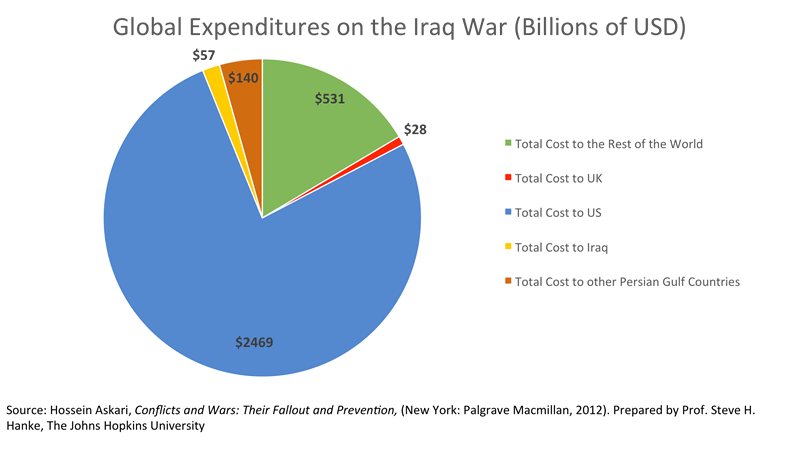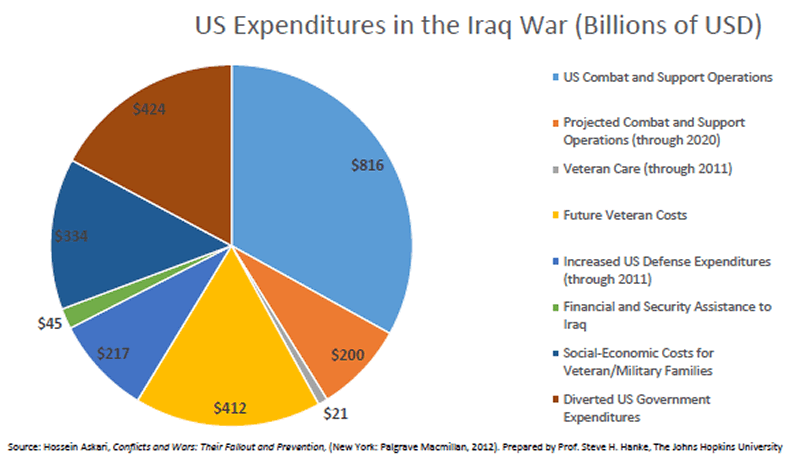Iraq: The Cost of Building a Failed State
Politics / Iraq War Jun 19, 2014 - 08:29 AM GMTBy: Steve_H_Hanke
 "Governments constantly choose between telling lies and fighting wars, with the end result always being the same. One will always lead to the other." - Thomas Jefferson
"Governments constantly choose between telling lies and fighting wars, with the end result always being the same. One will always lead to the other." - Thomas Jefferson
Nobel Laureate George Akerlof uses this edifying quote from Thomas Jefferson to good effect in his foreword of Hossein Askari's excellent read, Conflicts and Wars: Their Fallout and Prevention (Palgrave MacMillan, New York, 2012). Indeed, Prof. Akerlof has this to say about Askari's work:
Professor Askari begins by surveying the burden of military expenditures and of conflicts and wars. Their dollar expenditures, which are close to 15 percent of global GNP, exceed the cost of our financial crisis, of global warming, and what would be required for worldwide poverty reduction.
[...]
He bases his approach on three interrelated propositions: aggressors do not pay the full price of their aggression; governments will do nothing to change this state of affairs on their own; and, as a result, the process of reducing conflicts must originate in the private sector.
The U.S. shouldered a heavy load in the Iraq War, to the tune of $2.4 trillion from 2003-2011. As depicted in the chart below, the $2.4 trillion U.S. tab accounted for over 75 percent of global expenditures in the Iraq War.

If we dissect the $2.4 trillion in U.S. expenditures (see chart below), the picture becomes even clearer and, well, drearier. Iraq was a costly war for everyone involved, including U.S. taxpayers. The annual expenditure rate of the Iraq war comes out to $2,991 per U.S. taxpayer from 2003-2011 (based on the level of income tax returns), far higher than the annual tab per US taxpayer for the Afghan fiasco.

President Obama announced to Congress yesterday that he is deploying 275 military personnel to Iraq to secure the American embassy in Baghdad. Here we go, again.
By Steve H. Hanke
www.cato.org/people/hanke.html
Twitter: @Steve_Hanke
Steve H. Hanke is a Professor of Applied Economics and Co-Director of the Institute for Applied Economics, Global Health, and the Study of Business Enterprise at The Johns Hopkins University in Baltimore. Prof. Hanke is also a Senior Fellow at the Cato Institute in Washington, D.C.; a Distinguished Professor at the Universitas Pelita Harapan in Jakarta, Indonesia; a Senior Advisor at the Renmin University of China’s International Monetary Research Institute in Beijing; a Special Counselor to the Center for Financial Stability in New York; a member of the National Bank of Kuwait’s International Advisory Board (chaired by Sir John Major); a member of the Financial Advisory Council of the United Arab Emirates; and a contributing editor at Globe Asia Magazine.
Copyright © 2014 Steve H. Hanke - All Rights Reserved
Disclaimer: The above is a matter of opinion provided for general information purposes only and is not intended as investment advice. Information and analysis above are derived from sources and utilising methods believed to be reliable, but we cannot accept responsibility for any losses you may incur as a result of this analysis. Individuals should consult with their personal financial advisors.
Steve H. Hanke Archive |
© 2005-2022 http://www.MarketOracle.co.uk - The Market Oracle is a FREE Daily Financial Markets Analysis & Forecasting online publication.



